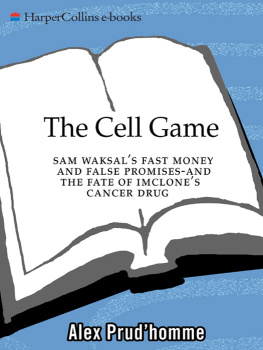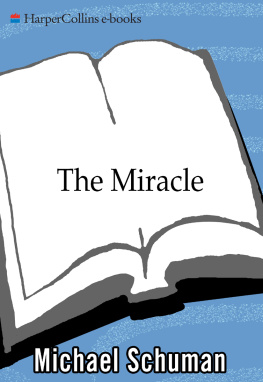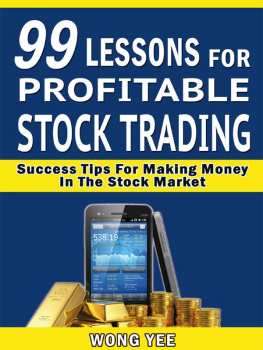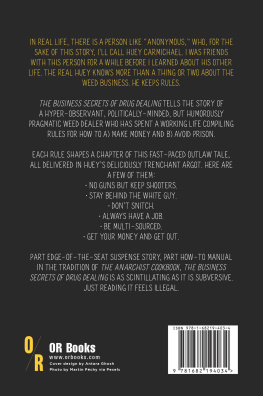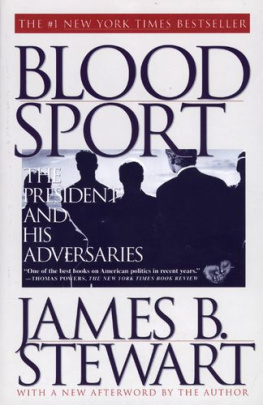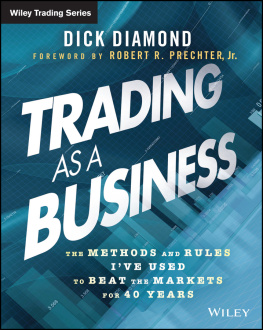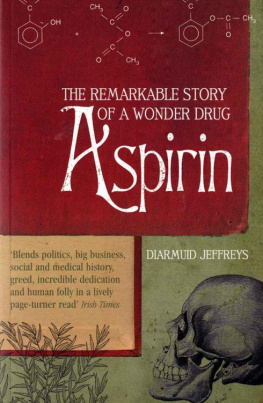Scientific theoriesbegin as imaginative constructions. They begin, if you like, as stories, and the purpose of the critical or rectifying episode in scientific reasoning is precisely to find out whether or not these are stories about real life.
There is a weird power in a spoken wordAnd a word carried farvery fardeals destruction through time as the bullets go flying through space.
A t 9:01 A.M. on December 27, 2001, an unemployed, 27-year-old actress named Aliza Waksal sold 39,472 shares of a small Manhattan biotech firm called ImClone Systems, Inc. It netted her some $2.5 million. At 9:41 A.M. , Jack Waksal, Alizas 80-year-old grandfather, sold approximately 111,336 shares of ImClone, for about $7 million. Both trades had been allegedly prompted by Sam Waksal, who was Alizas father and Jacks son; he was also the cofounder and CEO of ImClone. A short while later, Sam attempted to transfer an additional 79,797 shares of his own ImClone holdingsworth some $5 millioninto his daughters Merrill Lynch account for another sale. His instructions said the stock transfer was urgent and imperative. But Merrill compliance officers grew wary. This was not normal behavior for a CEO and his family. Because Sam was a company insider, his second trade in Alizas name was denied. It didnt take long for word of this activity to filter into Wall Street, where the rumor mill reported something fishy at ImClone Systems.
In 2001 ImClone was the undisputed star of biotech. A small Manhattan firm, it owned the license to the hottest cancer drug of the momenta monoclonal antibody called Erbituxin the latest class of cancer treatments, so-called targeted therapies. Health care was now a $1.3 trillion industry, and cancer drugs alone constituted a $10 billion-a-year business. A flurry of articles and a 60 Minutes story had hailed targeted treatments, and Erbitux in particular, as the biotech equivalent of smart bombs, which promised a new era in the war on cancer.
Erbitux is going to be huge, one of the biggest drugs in the history of oncologya drug that is going to alter the way cancer therapy is done from now on, Sam declared with an intense, nearly evangelical fervor. And then hed add: This drug will be a billion-dollar-a-year product.
He was a charming, reedy, olive-skinned man in his mid-50s, with thinning dark hair, roaming almond-shaped eyes, and a tricky grin. He had cofounded ImClone in the early 1980s with his younger brother, Harlan, to make a fortune conquering big diseases such as AIDS and cancer. After years of failure, ImClone had what every biotech company in the world wanted: Erbitux appeared to be a silver bullet, a seemingly magical cancer drug that would not only help thousands of dying patients, but would also make its sponsors rich and famous.
Sam spent years refining his pitch for Erbitux at investor meetings and leading hospitals across the country, in the halls of Congress, at biotech conferences in Europe and Japan, hed let people in on a little secret: ImClone is no ordinary investment, he seemed to whisper. Sure, Erbitux will soon be a billion-dollar-a-year drug, but its more than that. Much more. This is a miracle compound, a cutting-edge biopharmaceutical breakthrough. It will save the lives of thousands of dying cancer patients, and could change the very nature of science. Your investment will bring you not only gold but gloryyou could help us to make history!
It was a very seductive message, coming from a very persuasive man, and many bright and substantial people bought into it. Noted financiers like Robert Goldhammer, former vice chairman of Kidder Peabody, joined the ImClone board. So did world-famous oncologists like Dr. Vincent DeVita, the former head of the National Cancer Institute. Twenty-six leading hospitals around the nation, led by the esteemed Dr. Leonard Saltz, of Memorial Sloan-Kettering, had participated in the drugs clinical trial.
Sam had whetted investors appetites by predicting that his drug would be on the market by June 2002, well ahead of its nearest competitorsAstraZenecas Iressa and OSI Pharmaceuticals Tarceva, which were at least a year or two behind (a number of other targeted treatments were behind them, too). In the highly competitive and lucrative pharmaceutical business, such a first-mover advantage to market can be critical to a products success. The market responded by pushing ImClones stock price up in little excited jumps.
All Erbitux had to do was to pass muster with the U.S. Food and Drug Administration (FDA), the federal body that regulates new drugs. That wouldnt be a problem, Sam promised, because in February the agency had granted his drug special fast-track status, the quickest route to approval. Besides, the data spoke for itself: to win the FDAs blessing ImClone had to prove that Erbitux works to quell tumors in 15 percent of the patients in clinical trials; when used with chemotherapy, Erbitux had proved effective in 22.5 percent of patientsfar more than what the FDA required.
Unless Im sitting here and just boldly lying to you, which Im not in the habit of doing, I am telling you categorically the FDA told us that these studies will stand alone as full studies for approval, Harlan Waksal assured an analyst in the spring of 2001. We believe we will cruise through [the FDA approval process]. There will be a groundswell of activitybecause this drug is setting a new standard. Theres never been a drug thats been able to achieve this [result].
The press began to run prominent stories about the drug, and ImClone employees, and even their friends, were bombarded with requests from cancer patients around the country desperate for compassionate-use access to the still-experimental drug. ImClone galvanized the entire biotech market, and in September the company signed a record-setting, $2 billion partnership with pharmaceutical giant Bristol-Myers Squibb. From April to July, ImClones stock price surged from $27 to $53 per share. By early December it had reached $75 a share, and Sam and Harlan Waksal had exercised options with a combined worth of some $111 million.
A ND NOW , on December 26, 2001, just as years of painstaking work were about to pay off, something was going wrong. Sam had been vacationing on the resort island of St. Barts, partying with his art dealer, Larry Gagosian, and Harvey Weinstein, of Miramax, when his brother called with bad news: the FDA was about to reject Erbituxnot because the drug didnt work, but because ImClones data was sloppy and incomplete.
Keeping mum, saying hed return to the resort island soon, Sam immediately jetted back to New York on his leased private jet. Arriving back at his 5,000-square-foot loft in SoHo that night, he began to work the phonesfirst calling his father, Jack, and then, the next morning, his daughter. Unbeknownst to almost everyone, Samthe highest-paid CEO in biotechwas carrying a personal debt of $80 million, $65 million of which was on margin, secured by his ImClone stock. His monthly margin bill was a cool $800,000. If ImClone collapsed, he would be ruined. He panicked.
Early on the morning of the 27th, Sam instructed Aliza to sell her shares. She sold at $63.20 a share, and the stock began to head down toward $60. Sam attempted to shift some of his own shares to her account. He knew the SEC monitored stock trades by company insiders and their families, but he didnt stop to think about what he was doing; he was just acting. For years he had shuffled money offshore, or through an account he had secretly established in Alizas namehed forged her signatureand he figured it would all work out in the wash. He was doing good for humanity; his drug was about to change cancer medicine. So what if he cut a few corners? But just in case things didnt work out as planned, he took out an insurance policy by buying ImClone put options through an anonymous Swiss bank account: if the stock price dropped dramatically, hed profit by betting against his own company.

